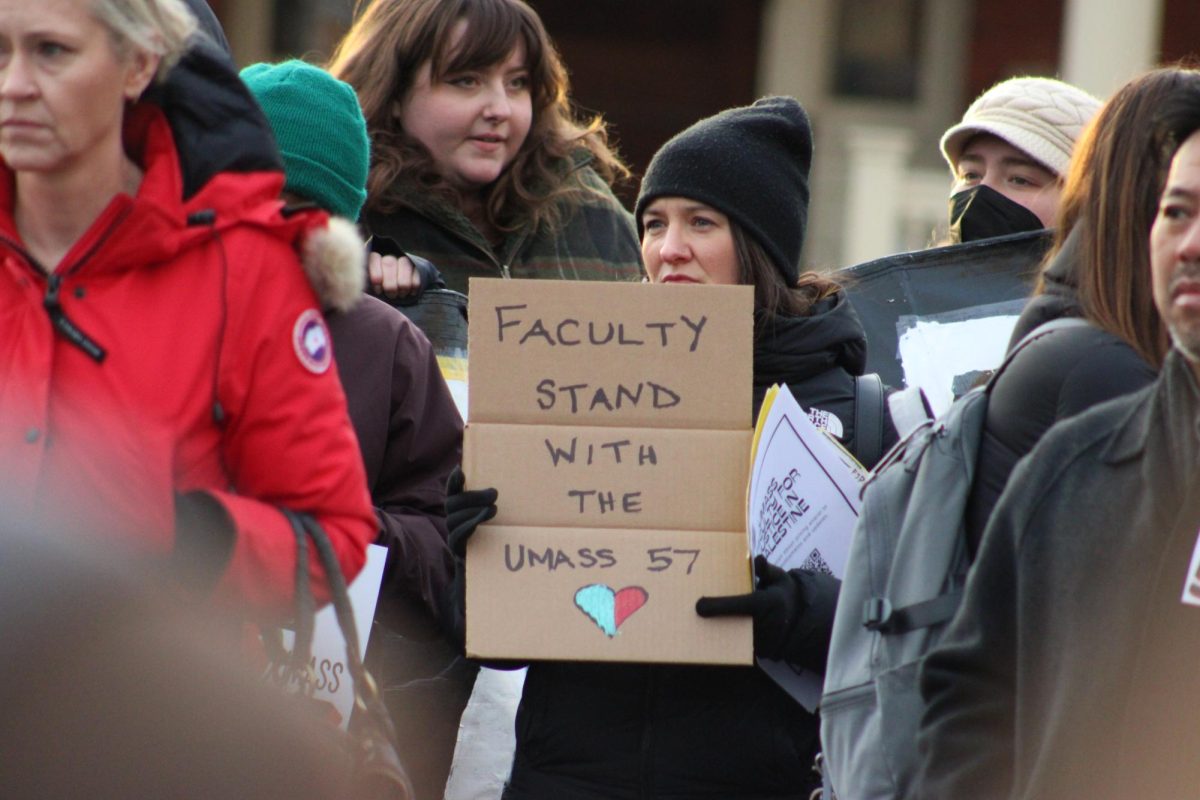Dear Editor,
This letter is in response to Chancellor Robert Holub’s latest e-mail to the UMass community.
In a time of financial uncertainty, it seems extremely odd that you focus your attention to the physical improvements being made on campus. The multitude of construction projects being done on campus will indeed beautify our campus and make it more appealing to prospective students, but in times of economic hardship, shouldn’t aesthetics come second to academic quality and improvement?
While I do not know where the money is coming form which built the fountains in the pond, or the new rotary on North Pleasant Street, or the marching band building which is currently under construction or the new recreation facility, I feel as though this money could have been used in ways which would have been more viable, which would better serve the advancement of the academic community. As budget cuts continue, I’m assuming that the gap will be filled by increased tuition and student fees. With the cost of education on the rise and a growing gap in the budget, I feel the University’s choice of spending is misguided and needs to be reformed.
Zachary Kamel
UMass Student 2012
—–
Dear Editor,
I am writing in response to the recent Collegian article entitled “SGA Debate Student Sanctions” in the Nov. 8, 2010 edition of the paper. Mr. Howard and I did discuss these matters after his presentation to the Senate. I welcomed that discussion and look forward to further discussions in the future.
There are, however, a few points in the article I would like to address.
First, the use of the term “legal administration” when referring to the Hearing Board procedures is not appropriate. The University’s discipline system is an administrative process, approved by the Board of Trustees, which ensures due process but is not guided by the standards of a court of law.
Second, the term used to describe how board members are selected, as “cherry-picked,” is inaccurate and an insult to the members of our community, students and staff, who volunteer their time to be trained and serve on these hearing boards. We invite all faculty, staff and students to consider becoming hearing board members through announcements in the Daily Collegian, In the Loop and with fliers distributed to SGA and to students through residence life staff. We believe it is important to have as diverse a board membership as possible, and we welcome any and all students who meet minimum requirements to apply to become members of the board.
Third, it is important to remember that our discipline process responds to reports we receive that students may have violated policy. To not respond would be negligent on our part.
Finally, it is true that students can be held responsible for violating university policy and/or laws by the court system for the same incident. Indeed, many institutions across the country work closely with local police departments to ensure that inappropriate behavior by students on campus and in the community is addressed to ensure the safety of everyone.
Anyone with additional questions about the discipline process is welcome to come in to the office to speak with us.
Sincerely,
Jo-Anne Vanin
Dean of Students
—–
Dear Editor,
I wanted to thank you for your coverage of “No Butts About It” day which took place on Nov. 7. I also wanted to update the campus community with the totals. In three hours, over 100 students picked up 46.1 pounds of cigarette butts. I want to thank all who participated in this event. And most of all, I want to thank the employees whose job it is to clean this campus everyday. They pick up cigarette butts and much more all the time, not just one time a year. I shudder to think what this campus would look like without them.
Tom Schiff
Center for Health Promotion
University Health Services
——
Dear Editor,
After reading Mike Tudoreanu’s column entitled “The Myth of Big Government.” I was stunned to see the column was printed when I know that the information within it is almost entirely inaccurate.
Tudoreanu states in the column that any American who accuse government of being too big are “liars” because that is an “opinion” as they don’t have “facts” to back up such a claim. He complains that there has been “silence” in response to questions regarding examples of where government has actually grown.
I’m about to break that “silence.”
Tudoreanu states, “In terms of government spending … there is still a decline, at least from 1980 to the present day. Total government spending in 1980 stood at 21.7 percent of GDP. In 2009 it was 20.7 percent.” But, according to Usgovernmentspending.com and others, Tudoreanu is providing inaccurate information here. Government spending as a percentage of GDP in 1980 was 33.72 percent and in 2010 it is approximated at 43.85 percent. On a side note, not only has the percentage gone up significantly, but the 43.85 percent is a higher percentage than of that found in multiple socialist European countries such as Germany.
Tudoreanu makes it seem as though the rich are getting away with paying less taxes every year. He demonstrates this through his example of the personal income tax rate by showing how America has seemingly been slashing taxes for years.
But the reality of the situation is that despite the income tax rate being slashed under Reagan, the rich are still taxed a lot more than most Americans know or realize. For starters, the U.S. corporate tax rate is the highest of any country in the world besides Japan. Secondly, as of 2008, the richest one percent of Americans contributed 37 percent of total income tax payments in the US. Compare that to the bottom 50 percent of earners in this country that combined to only contribute three percent of total income tax payments. Those numbers indicate the richest American’s have been pulling more than their fair share.
The truth is that the growth in spending as a percentage of GDP, the hundreds of billions being spent in stimulus, the government’s trillion dollars of spending in its attempted takeover of health care, government’s expansion into the control of the banks and its new found ownership in the auto industry are the facts.
Consider my conservative peers and me as no longer “silent.”
Sincerely,
Alex Perry
UMass Alumnus
Class of 2010






Diana McGinness • Dec 21, 2010 at 9:10 pm
BTW Alex,
Taxes were raised under Reagan:
http://firedoglake.com/2009/02/01/newsflash-ronald-reagan-raised-taxes-you-idiots/
Diana McGinness • Dec 21, 2010 at 7:09 pm
We Pay the Highest Income Tax in the World!
Wow! We do? Well, we are, after all, “the hardest working people in the world,” so it would make sense wouldn’t it that we pay the highest income tax, right? Let’s look at this. First of all which tax rate is being referenced? The “marginal tax rate” (the statutory rate you’ll find in the middle of your tax return pamphlet) or the “effective tax rate” (the one you actually pay after you take all your deductions)?
Turns out (http://moneycentral.msn.com/content/taxes/p148855.asp) it’s not so bad after all (at least in 2005) and with the Bush tax cuts, not much has changed or will until 2011. Now when it comes to corporate taxes, The Tax Foundation [http://politicsunspun.com/U.S.%20States%20Lead%20the%20World%20in%20High%20Corporate%20Taxes] has a lot to say about that. But here’s the rebuttal to their argument…”The [http://economistsview.typepad.com/economistsview/2008/08/the-greek-menac.html] Greek Menace (and here’s another…[http://www.smartmoney.com/investing/economy/high-corporate-tax-rate-is-misleading-22463/] ”High Corporate Tax Rates Are Misleading“). Here’s a CBO [http://www.cbo.gov/ftpdocs/69xx/doc6902/11-28-CorporateTax.pdf] report written in 2005 by Dennis Holtz-Eakin reporting the EFFECTIVE (not statutory) rates in 2003 ranked the US 6th behind Germany, Japan, Canada, Australia and the Netherlands.
“Summing Up. Compared with effective marginal corporate tax rates among the broad group of the 18 other OECD countries, rates in the United States in 2003 were close to the group’s average for equity-financed investments in machinery, substantially above the average for equity-financed investments in industrial structures, and substantially below the average for debt-financed investments in machinery.”
As you’ll note, Linda Beale [http://ataxingmatter.blogs.com/] states, “the actual tax rates paid by US corporations are extraordinarily low, around 6%” As we know, two-thirds of U.S. corporations paid no federal income taxes between 1998 and 2005 [http://money.cnn.com/2008/08/12/news/economy/corporate_taxes/], and 68 percent of foreign companies doing business in the U.S. avoided corporate taxes over the same period. And this GAO report was before Obama became President, so he had nothing to do with it.
So while they benefit from what the rest of the taxpayers provide – roads, bridges and other infrastructure, they get to use the legal loopholes that gives them excessive breaks. We also know that while 50% of households do not pay federal taxes, they pay many other taxes. 6%, Linda says…much, much less than my tax rate last time I filed. How about you?
While corporations are paying an effective tax rate of 6%, if they are one of the 2/3 who actually pay taxes, why do real taxpayers, like me who pay a much higher rate than they do, get stuck with the bill? They use the same infrastructure as we do – and probably much more often than we do? Our wages have remained stagnant while they received these tax breaks, they created no jobs with these tax breaks (before or since the crash), and have, in fact, received tax breaks that benefit them from keeping their money and our jobs offshore. Isn’t it time they pay their fair share and we return these dollars to this country where they can be used to not only create jobs, be used for research and development (rather than more tax payer dollars being used for R&D) and pay down the debt/deficit so many are concerned about?
Kyle • Dec 7, 2010 at 8:26 am
the richest 1 percent makes 45% of the money in this country, so no they aren’t paying their fair share. sorry bud.
Greg • Nov 19, 2010 at 4:43 pm
I don’t understand Alex’s point about taxes. According to him, the rich are still paying a lot of taxes. Ok. That doesn’t change the fact that they pay lower taxes than they used to.
Kate • Nov 19, 2010 at 2:46 pm
To address Mr. Perry:
Please tell us something that hasn’t already been said ad nauseam by the extreme right-wing, namely the Libertarians currently posing as Republicans. The opinion is still wrong and will forever more continue to be wrong, despite it being said and written over and over again.
Besides, the source you cited cannot be considered valid. The creator of that site is also a raving right-wing extremist who peddles the ideals of the ruling class. Therefore, I hold nothing you say to be true and no one else should either. For anyone interested in how I came to this conclusion, check out the author’s bio: http://www.roadtothemiddleclass.com/oped91_biography.html
Max • Nov 18, 2010 at 8:58 pm
Alex Perry,
When you cite economic facts and figures, please resist the urge to simply copy-n-paste from tea party websites like “Usgovernmentspending.com.”
For anyone interested in the actual data you can find it here http://www.gpoaccess.gov/usbudget/fy11/sheets/hist15z3.xls
Federal budget’s share of GDP was 21.7% in 1980 and 24.7 in 2009. Total state+local+federal figures were 31.3 and 36.5 percent respectively. There was a moderate increase in spending due to the recession, but nothing much.
Mike Tudoreanu • Nov 18, 2010 at 1:16 am
A brief clarification regarding my column, “The Myth of Big Government”:
The numbers I used for government spending come from official statistics published at http://www.gpoaccess.gov .
I am aware that private individuals, such as conservative author Christopher Chantrill (who runs usgovernmentspending.com) have published different numbers. However, for the sake of accuracy, I use the official statistics.